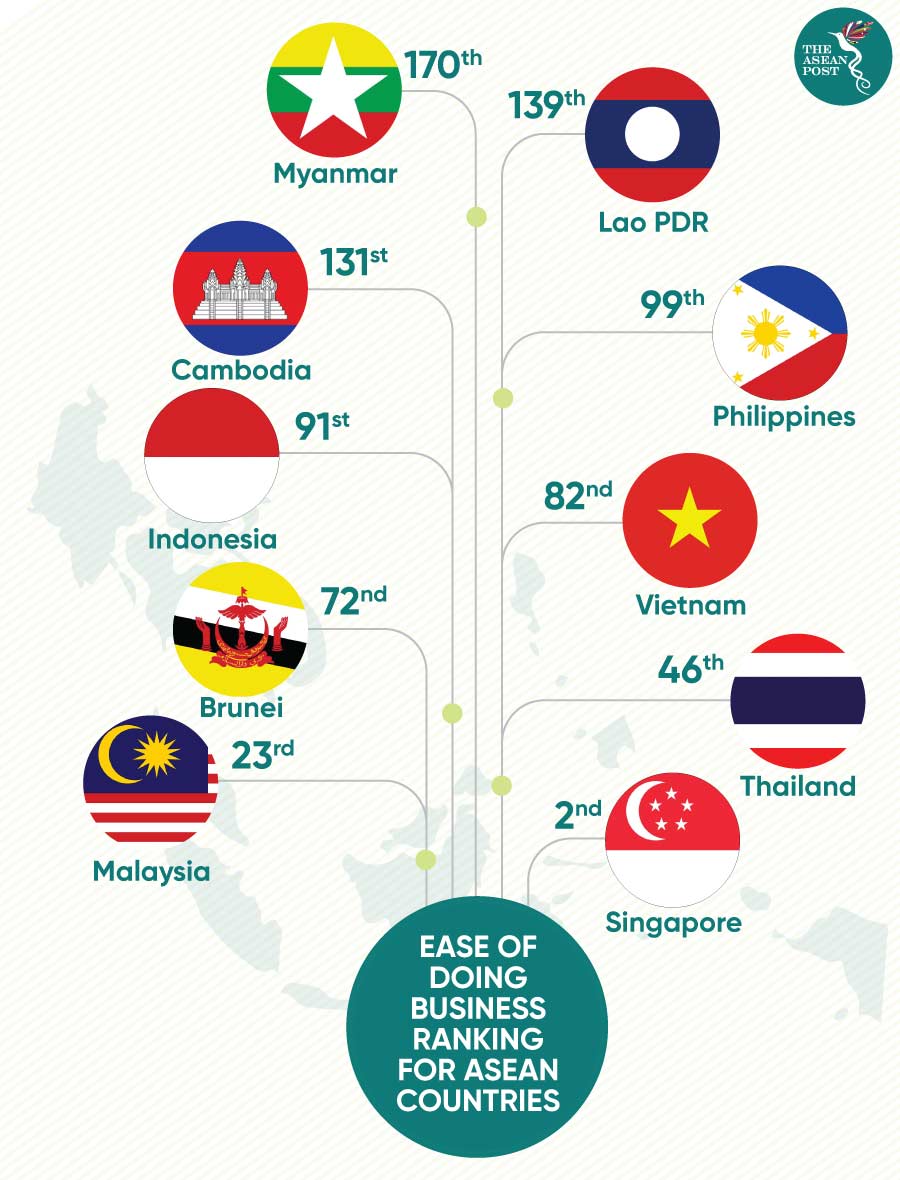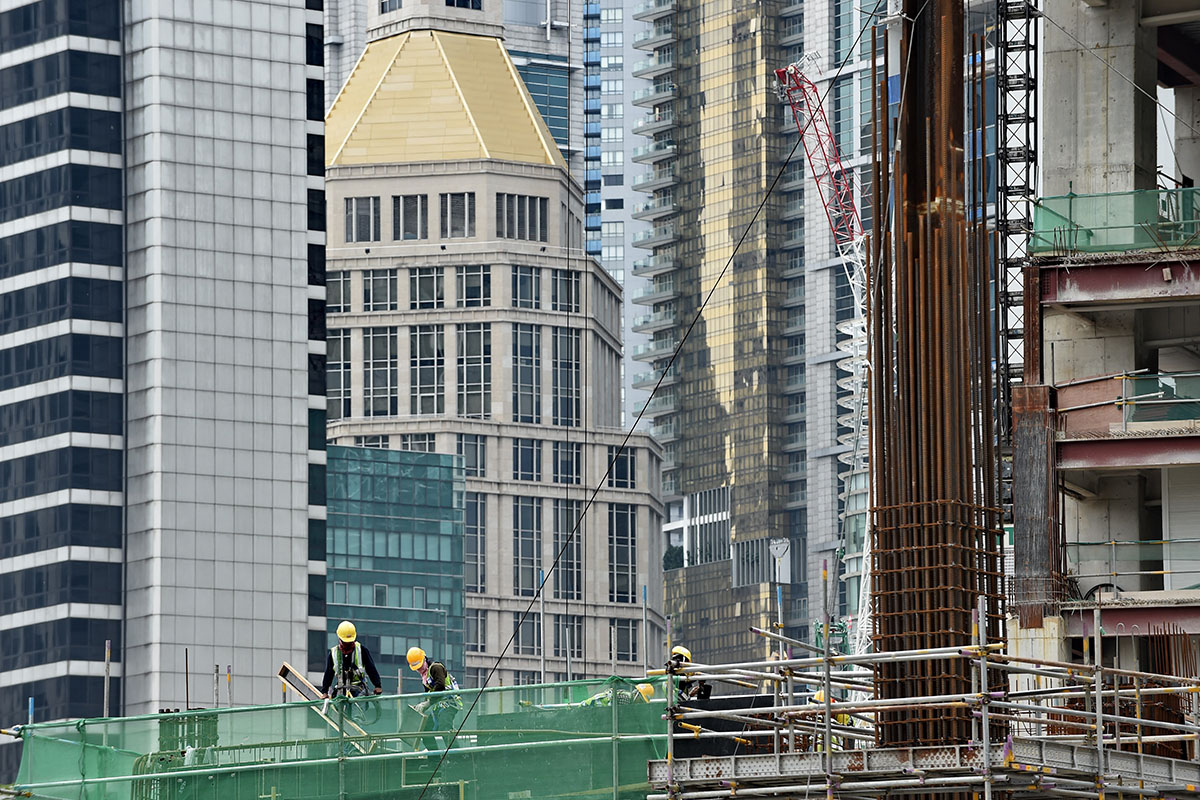Southeast Asia is a growing market for business. However, there is still plenty of untapped potential, in terms of both consumer demand and labour markets. With all eyes on the ASEAN (Association of Southeast Asian Nations) member states, business investors are presented with opportunities to generate lucrative returns on their investments within the region. In order to achieve that, businesses must first get accustomed to the laws, regulations and prerequisites in specific countries for starting up a business, such as the ease of setting up a business, access to credit, construction permits, property registration procedures and taxation laws. This may be a daunting and time consuming task for some, but it is a crucial step in assessing the risk of starting up businesses in a foreign country. Investors could also base their preliminarily research on the ease of doing business published by the World Bank Group – named "Doing Business 2017". Here's a quick summary on the ease of doing business in Southeast Asia based on individual ASEAN member countries:
Singapore
The highest ranked ASEAN country in terms of the ease of doing business is Singapore, which occupies the number two spot on the global ranking. The island nation improved on its process of obtaining construction permits, registering property and paying taxes compared to previous years. The Singaporean government made dealing with construction permits much easier by streamlining procedures and improving its one-stop online shop as the nation is bumped up 14 places from its 24th ranking in 2016 for that category. It also eased the process of registering a property by introducing an independent mechanism for reporting errors on titles and maps while improving its online system for filing taxes.
Malaysia
Taking the 23rd spot on the global ranking, Malaysia fell one place from the previous year largely due to restrictions in starting businesses imposed by the government. Malaysia suffered a whopping drop of 59 rungs from 53rd in the category of ease in starting a business because of requirements set by the government for requiring companies with an annual revenue of more than RM500,000 (over 119,000 dollars)to register as a GST (Goods & Services Tax) payer. Nevertheless, the country north of Singapore has shown vast improvements in the aspects of getting credit and paying taxes by making credit scores easily accessible to consumers while replacing the sales tax with GST and creating an online system to pay taxes.
Thailand
Despite the political turmoil that is currently taking place in the country, Thailand’s global ranking remains unchanged from its previous year at 46. The Thai government, has been keen on reforms and this is shown in several areas. Those wishing to start businesses in the country now face less restrictions as the government has created a single window for registration payment and reducing the time to obtain a company seal. Credit is also easier to obtain as the government has made better the access to credit information by starting to provide credit scores to banks and financial institutions. Thailand has also made resolving insolvency easier by introducing new restructuring for small and medium-size companies and by streamlining provisions related to company liquidation.
Brunei
The tiny monarchy, situated in the island of Borneo ranks 72 this year, up 25 places from 97 in the previous year. Brunei has improved vastly vis-à-vis the quality and efficiency for companies to obtain electricity to run their premises. Previously ranked 76 in this regard, it now sits at 21st, up 51 places. The Bruneian government has also taken steps to protect minority investors and to strengthen its insolvency framework. Beside that, it is now easier to obtain credit, pay off taxes and trade across border thanks to reforms introduced by the government.
Indonesia
The largest country in ASEAN fared better in 2017, moving up 16 places from last year to rank 91st this year. The government made significant reforms for those seeking to start new businesses by creating a single form to apply for the company registration certificate and trading license, abolishing the minimum capital requirement for small and medium-size enterprises and by encouraging the use of an online system to reserve company names. Apart from that, the timeframe for businesses to obtain electricity has improved, paying taxes is now easier via an online system and cross border trading has significantly eased thanks to the Indonesia National Single Window – a government economic initiative.
The Philippines
The Philippines remained unchanged from its 99th spot last year. Nevertheless, the government did make improvements in two sectors, mainly in dealing with construction permits and paying taxes. Construction permits are now easier to obtain due to the increasing the transparency of its building regulations. Those seeking ease of paying taxes can breathe a sigh of relief as an online system for filing and paying health contributions and by allowing for the online corporate income tax and VAT returns to be completed offline had been introduced. The largest pitfalls are in terms of obtaining credit as there still isn’t a unified legal framework for secured transactions in the economy.

Vietnam
Vietnam ranks 82 out of 190 economies globally, up from 91 previously. Although it is difficult to start up a business in Vietnam, the economy poses a good business investment opportunity because of the following business advantages. Vietnam has strengthened minority investor protections by making it easier to sue directors in cases of prejudicial transactions between interested parties, increased shareholder rights and role in corporate decisions, strengthened ownership and control structures as well as increase corporate transparency requirements. Vietnam has also made paying taxes easier by streamlining the administrative process of complying with tax obligations. Furthermore, Vietnam has also made exporting and importing across borders easier by implementing an electronic customs clearance system.
Cambodia
Cambodia ranks 131 out of 190 economies in the report, down from 128 last year. Nevertheless, the credit bureau has started to provide credit scores to banks and financial institutions, thus improving access to credit information – subsequently ranking Cambodia's credit facility at seven. This opens opportunities for small businesses in Cambodia with a good financial history to get credit. Moving forward, Cambodia needs to make starting a business easier to promote a more conducive business environment that will boost the local economy and create more lucrative job prospects. In a press release circulated by World Bank, country manager for Cambodia, Inguna Dobraja said "Cambodia has been making progress in promoting a better business environment. The reforms that Cambodia has been pursuing are helping to create a vibrant economy, which will boost prospects for many Cambodians and lift them out of poverty.”
Lao PDR
Ranking 139th out of 190 countries, Lao has allowed greater platform for businesses by reducing the time to start a business by implementing simplified procedures for obtaining a license and a registered company seal. It currently takes a business eight procedures and 67 days to start. Lao has also improved the regulation of outages by beginning to record data for the annual SAIDI (system average interruption duration index) and SAIFI (system average interruption frequency index). These two are commonly used indices from distribution utilities. SAIDI and SAIFI include all types of outages – including load shedding or planned power cuts for maintenance.
Myanmar
This year, Myanmar has moved up one place in the ranking, from 171 to 170. This nation ranks the lowest among all of its ASEAN counterparts in terms of ease of doing business. However, business regulatory environment in Myanmar has improved from government reforms that have reduced regulatory complexity for businesses and improved the country’s credit information system. Myanmar has simplified the start process by removing the requirement to submit a reference letter and a criminal history certificate in order to incorporate a company. In order to start a business in Myanmar, businesses have to go through eleven procedures, that will take up to 13 days. Myanmar has also improved its credit information system by establishing of a new credit bureau.
While trade liberalisation is expected to boost economic growth in the ASEAN region, development disparities between the frontier CLMV (Cambodia, Lao, Myanmar and Vietnam) economies and the other six economies (Brunei, Indonesia, Malaysia, Philippines, Singapore and Thailand) may widen. If these disparities continue, they could hamper the progress of regional economic integration, as aimed by the AEC (ASEAN Economic Community). To stay on par, the CLMV countries need to improve physical infrastructures, regulatory procedures and human resources, soundness of economic policies and political stability. By improving these conditions, the CLMV countries will be able to improve their business environment and take full advantage of their under-used potential.
